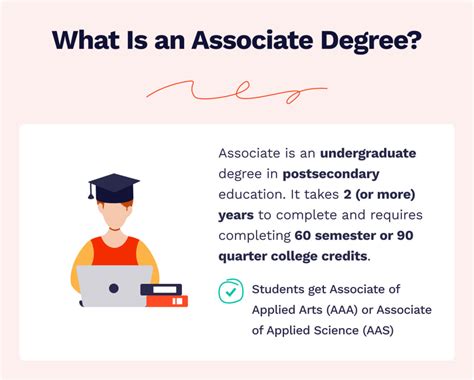What is an Associate Degree?
An associate degree is a two-year post-secondary qualification that prepares students for specific careers or further academic study. These degrees typically focus on hands-on skills and technical knowledge in a particular field.

Types of Associate Degrees
There are two main types of associate degrees:
- Associate of Arts (A.A.): Designed for students who plan to transfer to a four-year college or university.
- Associate of Science (A.S.): Prepares students for entry-level employment in a specific field.
Requirements for an Associate Degree
The specific requirements for an associate degree vary depending on the institution and program. However, general requirements include:
Academic Requirements
- High school diploma or equivalent (e.g., GED)
- Minimum GPA of 2.0 or higher
- Completion of general education courses, such as English, math, science, and social studies
Coursework Requirements
- Concentration in a specific field, such as business, healthcare, technology, or education
- Completion of core courses in the field of study
- Electives to fulfill degree requirements
Other Requirements
- May include standardized test scores (e.g., SAT, ACT)
- Letters of recommendation
- Portfolio or work experience
Benefits of an Associate Degree
- Career Advancement: Qualifies graduates for entry-level positions in their field.
- Increased Earnings: According to the Bureau of Labor Statistics, associate degree holders earn an average of 30% more than those with only a high school diploma.
- Transfer Opportunities: Provides a pathway for students to transfer to a four-year college or university.
- Personal and Intellectual Growth: Enhances critical thinking, problem-solving, and communication skills.
Choosing an Associate Degree Program
When selecting an associate degree program, it is important to consider:
- Career Goals: Choose a program that aligns with your career aspirations.
- Program Reputation: Research the reputation and accreditation of the institution and program.
- Program Length: Consider the time commitment and whether a two-year program is feasible.
- Cost: Determine the tuition, fees, and other expenses associated with the program.
Career Options with an Associate Degree
Associate degrees open up a wide range of career options, including:
| Field | Job Titles | Median Annual Salary (Bureau of Labor Statistics) |
|---|---|---|
| Business | Administrative Assistant, Financial Analyst, Marketing Manager | $61,950 |
| Healthcare | Medical Assistant, Licensed Practical Nurse, Pharmacy Technician | $48,820 |
| Technology | Computer Support Specialist, Software Developer, Web Designer | $100,910 |
| Education | Early Childhood Educator, Elementary School Teacher, Paralegal | $61,070 |
Skills Developed in an Associate Degree Program
Associate degree programs develop essential skills for career success, such as:
| Skill | Description |
|---|---|
| Technical Expertise | Specialized knowledge and abilities in the field of study |
| Communication | Clear and effective verbal and written communication |
| Critical Thinking | Ability to analyze, evaluate, and synthesize information |
| Problem-Solving | Capacity to identify and resolve problems creatively |
| Teamwork | Ability to collaborate with others in a team environment |
Trends in Associate Degree Programs
- Online Learning: Increasing demand for online associate degree programs due to flexibility and accessibility.
- Microcredentials: Bite-sized credentials that provide specific skills and knowledge, often offered in partnership with industry leaders.
- Stackable Credentials: Allow students to accumulate multiple credentials over time, eventually earning an associate degree.
- Customized Programs: Institutions are developing tailored programs to meet the specific needs of employers and industries.
- Dual Enrollment: Partnerships between high schools and colleges that allow students to earn college credits while still in high school.
In Conclusion
An associate degree is a valuable investment in your education and career prospects. With careful planning and consideration, you can choose a program that will equip you with the skills and knowledge to succeed in your chosen field.
